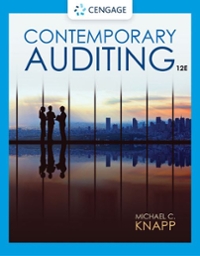In the summer of 2002, the U.S. Congress hurriedly passed the Sarbanes-Oxley Act (SOX). The SOX legislation
Question:
In the summer of 2002, the U.S. Congress hurriedly passed the Sarbanes-Oxley Act (SOX). The SOX legislation contained the most far-reaching financial reporting reforms at the federal level since the passage of the Securities Act of 1933 and the Securities Exchange Act of 1934. The reforms included a requirement that public companies have their internal controls over financial reporting audited by an independent accounting firm. That requirement, which became effective for most companies in 2004, forced U.S. companies to spend billions of dollars to rethink and, in many cases, completely overhaul their internal control systems.
The SOX legislation was an economic boon for Deloitte and the other Big Four accounting firms since those firms were ideally suited to provide the thousands of internal control audits mandated by SOX. To take full advantage of this large new revenue stream, these firms redesigned their audit processes, retooled their organizational structures, and hired a large number of new employees.
SOX also established a new regulatory structure for the independent audit function that had far-reaching implications for the major accounting firms. The role of the new Public Company Accounting Oversight Board (PCAOB) was to strengthen and improve the independent audit function for public companies and thereby minimize the likelihood of "audit failures." Many parties have alleged that the Enron and WorldCom fiascoes could have been avoided, or at least mitigated, if those companies' financial statements had been audited more rigorously.
Based in Washington, D.C., the PCAOB, commonly referred to as "Peek-a-boo" by auditing practitioners, falls under the regulatory purview of the Securities and Exchange Commission (SEC). The PCAOB's operations are overseen by five board members appointed by the SEC; it has several hundred employees and an annual operating budget exceeding $250 million. The agency's regulatory mandate includes registering and monitoring accounting firms that audit public companies required to file periodic financial statements with the SEC. Other responsibilities of the PCAOB include establishing auditing, ethical, and quality control standards for those firms and carrying out disciplinary investigations.
The years immediately following the passage of SOX presented exciting and profitable opportunities for the Big Four accounting firms but posed enormous challenges for them as well. No one knew exactly how the new regulatory agenda and infrastructure would impact the nature of financial reporting and the independent audit function in the United States. Despite the uncertainty they faced, James Fazio and other Big Four audit partners had more pressing concerns at the time, namely, the everyday "business" of, and professional responsibilities associated with, supervising the audits of their clients.
Questions
1. Describe what you believe is implied by the term "engagement risk." What are the key factors likely considered by Deloitte and other audit firms when assessing engagement risk? How, if at all, are auditors' professional responsibilities affected when a client poses a higher-than-normal degree of engagement risk?
2. What quality control mechanisms should major accounting firms have in place to ensure that audit partners have the proper training and experience to supervise audit engagements?
3. Identify the accounting standards and concepts that dictate the proper accounting treatment for sales returns. How were these standards and concepts violated by Ligand?
4. During the review of Ligand's first-quarter financial statements for 2004, the Deloitte auditors learned that the company had significantly underestimated its future sales returns at the end of 2003. What responsibility, if any, did this discovery impose on the Deloitte auditors?
5. Since its inception, the PCAOB has been criticized by many parties. Summarize the principal complaints that have been directed at the PCAOB. Do you believe this criticism is justified? Explain. What measures could the PCAOB take to improve its effectiveness and efficiency as a regulatory body?
Step by Step Answer:






